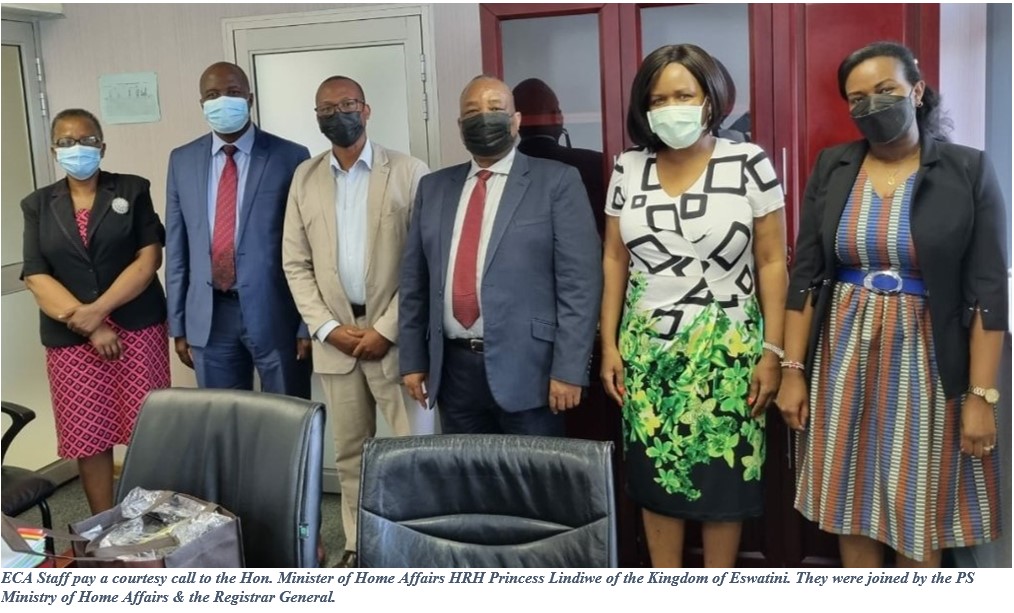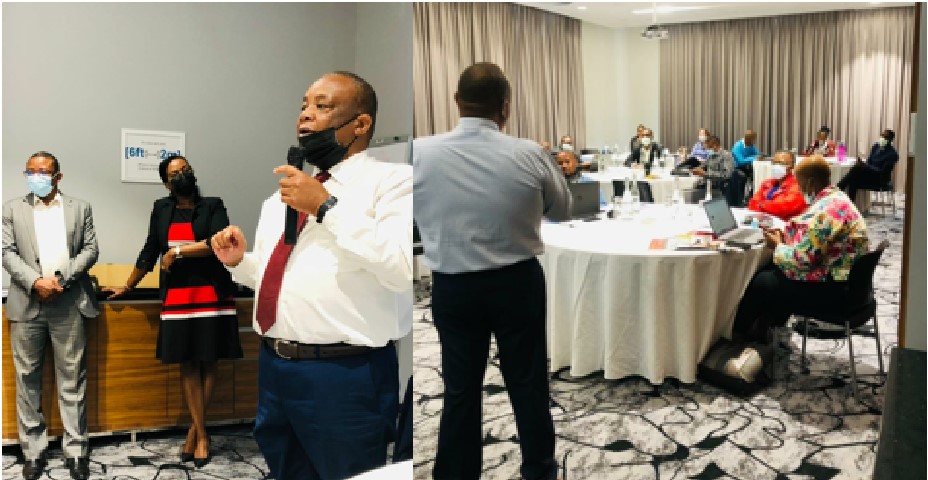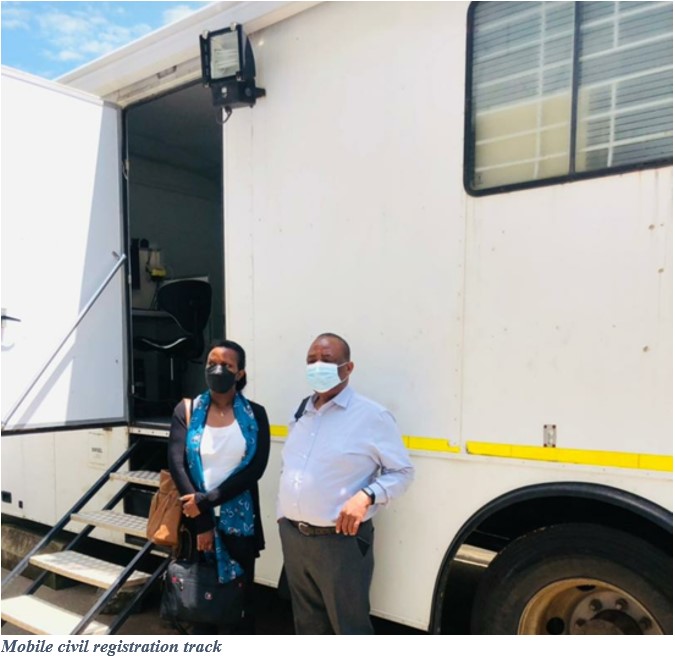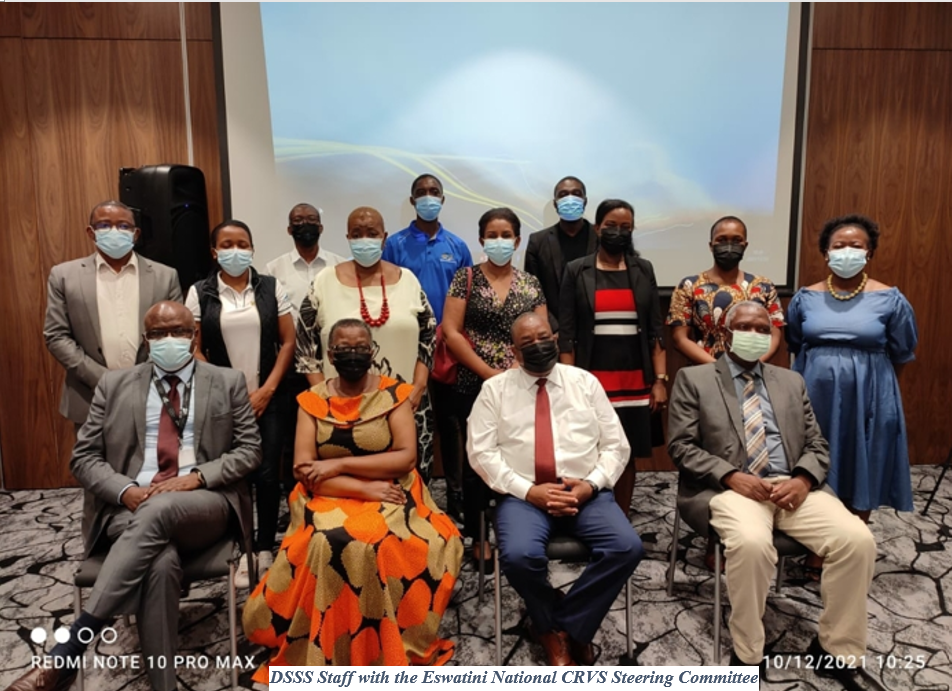Eswatini est devenu le 2e pays à lancer officiellement la phase deux du programme de mentorat d'amélioration des statistiques de l’état civil
Publié le 12/2/2022

The Chief of Demographics and Social Statistics Section of ECA who attended the workshop was joined by a CRVS technical staff in high-level engagements with the Government of the Kingdom of Eswatini. To begin with, the team met with the top leadership of the Ministry of Home Affairs led by the Minister and the Principal Secretary, where they discussed the vision of the Ministry on improving the CRVS programme. This was followed by engagements with the national steering committee and the CRVS technical working group comprising of representatives from Ministry of Home Affairs, Ministry of Health, Ministry of Economic Planning and Development - Central Statistics Office, Deputy Prime Minister’s Office, Ministry of Tinkhundla Administration and Development and development partners represented by UNICEF, WHO and ICAP.
National Stakeholders’ Workshop
 The ECA staff from the Demographics and Social Statistics Section (DSSS) facilitated a three days’ workshop organized by the national CRVS technical working group. It brought together senior level technical government officials from the Ministry of Home Affairs (MOHA) – the department of CRVS and the central database agency; Central Statistics Office (CSO) in the Ministry of Economic Planning and Development (MEPD); Ministry of Health (MOH); Deputy Prime Minister’s Office (DPMO); Ministry of Tinkhundla Administration and Development (MTAD) and the Ministry of ICT (MICT - GCS). The workshop was also attended by representatives of the Development Partners including UNICEF Eswatini Country Office, WHO Eswatini and ICAP Eswatini PEPFAR project.
The ECA staff from the Demographics and Social Statistics Section (DSSS) facilitated a three days’ workshop organized by the national CRVS technical working group. It brought together senior level technical government officials from the Ministry of Home Affairs (MOHA) – the department of CRVS and the central database agency; Central Statistics Office (CSO) in the Ministry of Economic Planning and Development (MEPD); Ministry of Health (MOH); Deputy Prime Minister’s Office (DPMO); Ministry of Tinkhundla Administration and Development (MTAD) and the Ministry of ICT (MICT - GCS). The workshop was also attended by representatives of the Development Partners including UNICEF Eswatini Country Office, WHO Eswatini and ICAP Eswatini PEPFAR project.
 During the workshop, the team oriented the stakeholders on the CRVS improvement mentorship program and deliberated on the performance of key CRVS indicators, guided by presentations from the MOHA, the MOH and the CSO. Further to this, the team analyzed stakeholders’ engagement and their contribution to the programme. One of the key findings of the mission is that the country is in the process of developing its CRVS Strategic Plan (SP), the Integrated Civil Registration and Vital Statistics Strategy 2021-2026. This provides a great opportunity for the mentorship programme to inform the SP’s priorities through the business process review, a critical and important process in identifying performance bottlenecks and areas of improvement.
During the workshop, the team oriented the stakeholders on the CRVS improvement mentorship program and deliberated on the performance of key CRVS indicators, guided by presentations from the MOHA, the MOH and the CSO. Further to this, the team analyzed stakeholders’ engagement and their contribution to the programme. One of the key findings of the mission is that the country is in the process of developing its CRVS Strategic Plan (SP), the Integrated Civil Registration and Vital Statistics Strategy 2021-2026. This provides a great opportunity for the mentorship programme to inform the SP’s priorities through the business process review, a critical and important process in identifying performance bottlenecks and areas of improvement.
Field Visit
ECA identified areas for consideration during the CRVS improvement programme including enhanced collaboration between the MOHA and MOH through improved linkages at operational level and data management. Demand creation through enforcement of use of registration documents, ease of stringent requirements for registration, and review of the legal framework were identified as important areas of intervention. An immediate next step for the country will be conduct of the business process review aimed at informing the development of the Integrated Civil Registration and Vital Statistics Strategy 2021-2026. The recommendations were presented to the steering committee on the last day of the mission, with the committee emphasizing the need for improved collaboration between all the key actors, including MOHA and MOH.
The ECA team had an opportunity to visit the civil registration and identity management offices in Manzini. The visit provided insight into one of the flagship projects by the Ministry of Home Affairs and the Ministry of Health, the “closing of the tap initiative”, aimed at improving birth registration coverage. It ensures that as the government mops up all unregistered births, no hospital events go unregistered to avoid spilling more cases into the flooded backlog of unregistered cases. Another successful strategy for mop-up is the mobile registration for hard-to-reach populations through use of tracks equipped with registration equipment and materials. The team also visited the ID offices whereby the digitization of the identity management component is providing an opportunity for linkage with birth and death registration to enable real-time production of the population register. This is in line with the United Nations legal identity agenda and realization of SDG target 16.9 – legal identity for all, including birth registration, by 2030.

Link: https://twitter.com/VioletNjenga/status/1467866138730184705?s=20